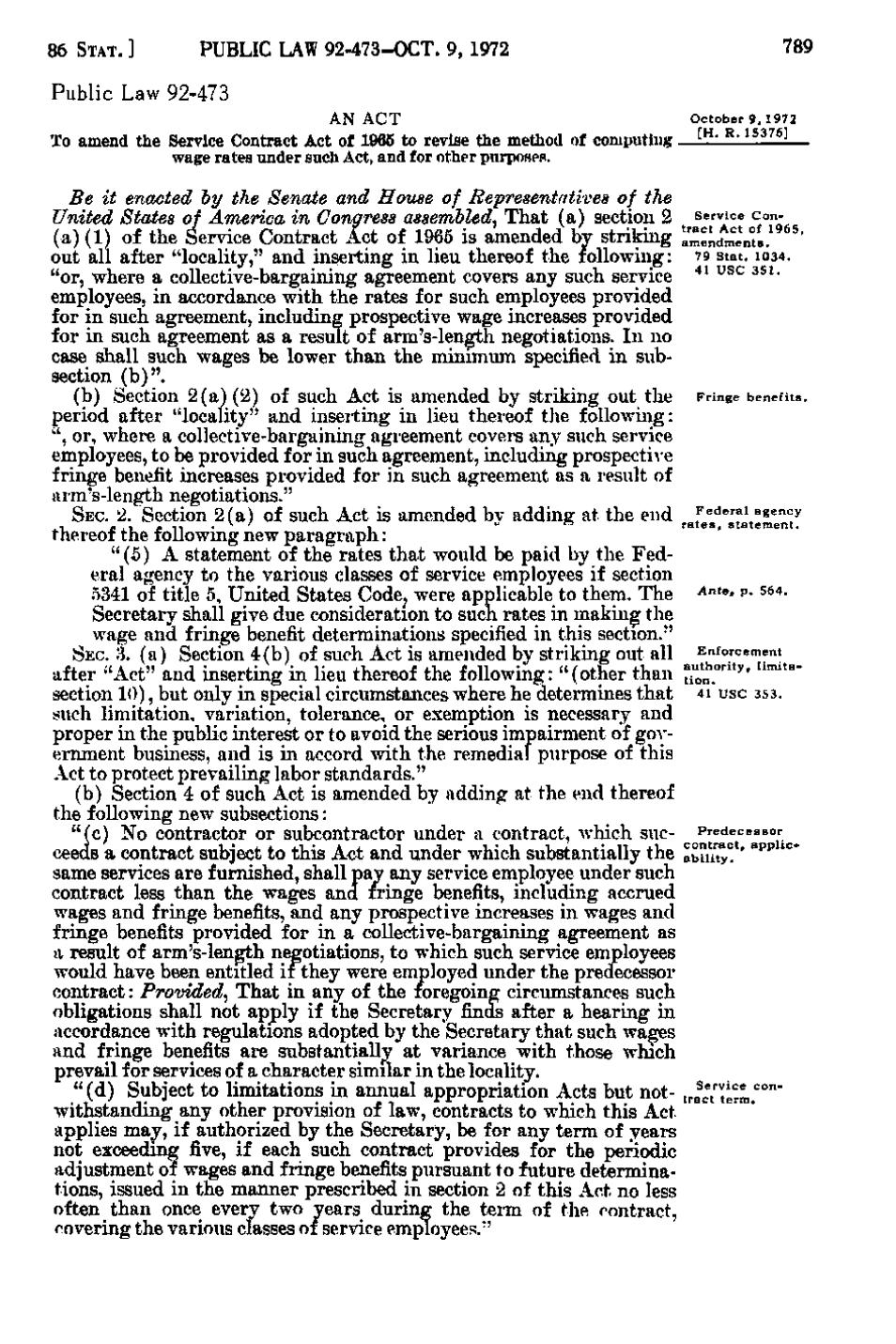86 STAT. ]
PUBLIC LAW 92-473-OCT. 9, 1972
789
Public Law 92-473 AN ACT
October 9, 1972 FH R 153761
To amend the Service Contract Act of 1965 to revise the method of computing —L_:—: 1— wage rates under such Act, and for other purposes. Be it enacted by the Senate and House of Representatives of the United States of America in Congress assembled, That (a) section 2 Service Con(a)(1) of the service Contract Act of 1965 is amended by striking I'^end^in'tl,^^^^' out all after "locality," and inserting in lieu thereof the following: 79 Stat. 1034. "or, where a collective-bargaining agreement covers any such service ^^ ^^^ ^^^* employees, in accordance with the rates for such employees provided for in such agreement, including prospective wage increases provided for in such agreement as a result of arm's-length negotiations. In no case shall such wages be lower than the minimum specified in subsection (b)". (b) Section 2(a)(2) of such Act is amended by striking out the Fringe benefits period after "locality" and inserting in lieu thereof the following: ", or, where a collective-bargaining agreement covers any such service employees, to be provided for in such agreement, including prospective fringe benefit increases provided for in such agreement as a result of arm's-length negotiations." SEC. 2. Section 2(a) of such Act is amended by adding at the end federal agency _
-
_
r
t
T
i
.
^
'
^
T
"
r ates. statement. ra t e s, statf»mf»nt.
thereof the lollowing new paragraph: "(5) A statement of the rates that would be paid by the Federal agency to the various classes of service employees if section Ante, p. 564. 5341 of title 5, United States Code, were applicable to them. The Secretary shall give due consideration to such rates in making the wage and fringe benefit determinations specified in this section." SEC. 3. (a) Section 4(b) of such Act is amended by striking out all Enforcement after "Act" and inserting in lieu thereof the following: "(other than ^^*n°*^' ^™^*°' section 10), but only in special circumstances where he determines that 41 USC 353. such limitation, variation, tolerance, or exemption is necessary and proper in the public interest or to avoid the serious impairment of government business, and is in accord with the remedial purpose of this Act to protect prevailing labor standards." (b) Section 4 of such Act is amended by adding at the end thereof the following new subsections: "(c) No contractor or subcontractor under a contract, which sue- Predecessor ceeds a contract subject to this Act and under which substantially the abmty'l °^^^"" same services are furnished, shall pay any service employee under such contract less than the wages and fringe benefits, including accrued wages and fringe benefits, and any prospective increases in wages and fringe benefits provided for in a collective-bargaining agreement as a result of arm's-length negotiations, to which such service employees would have been entitled if they were employed under the predecessor contract: Provided, That in any of the foregoing circumstances such obligations shall not apply if the Secretary finds after a hearing in accordance with regulations adopted by the Secretary that such wages and fringe benefits are substantially at variance with those which prevail for services of a character similar in the locality. Service " (d) Subject to limitations in annual appropriation Acts but not- tract term.conwithstanding any other provision of law, contracts to which this Act applies may, if authorized by the Secretary, be for any term of years not exceeding five, if each such contract provides for the periodic adjustment of wages and fringe benefits pursuant to future determinations, issued in the manner prescribed in section 2 of this Act no less often than once every two years during the term of the contract, covering the various classes of service employees."
�
